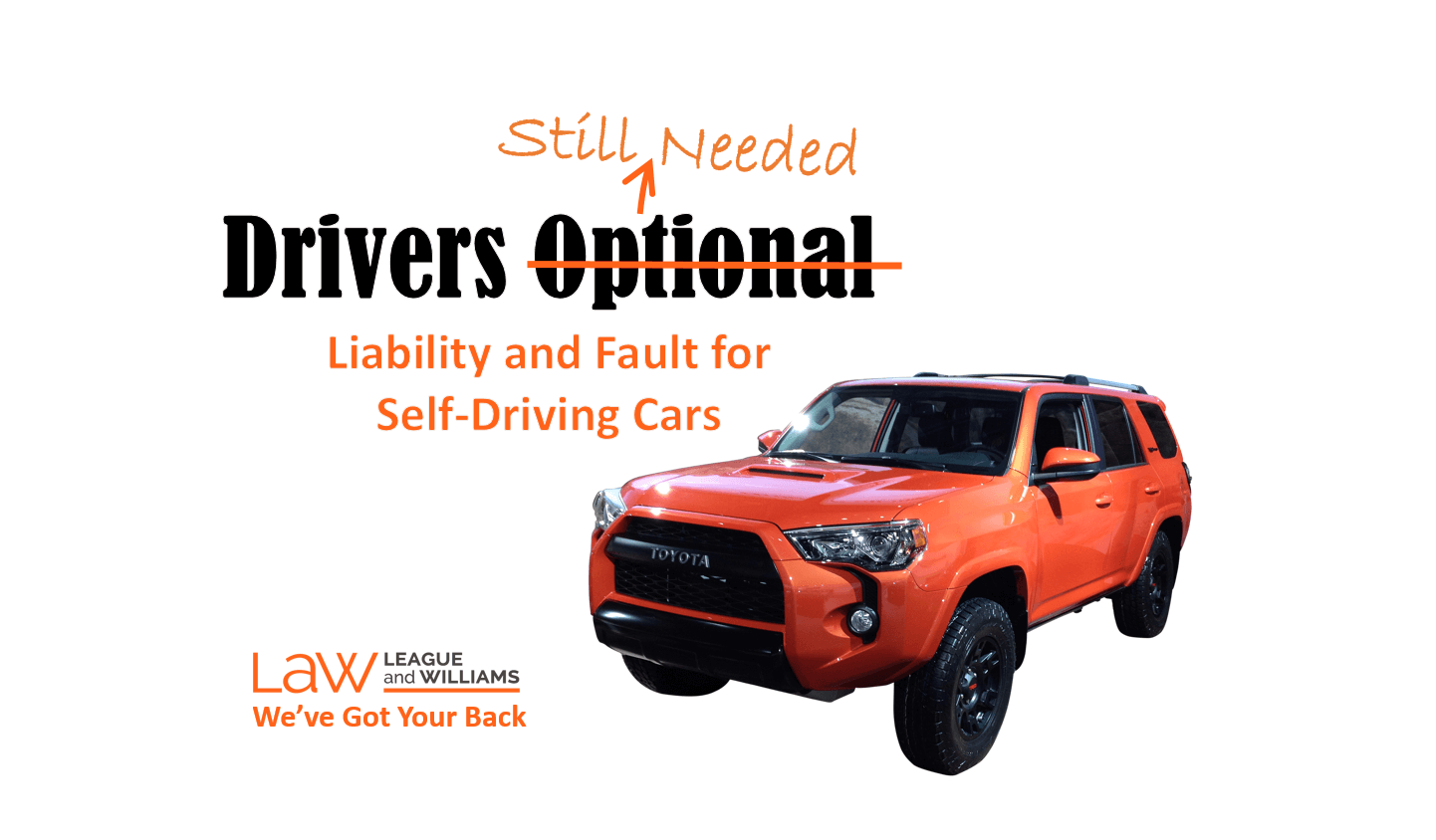GET IN TOUCH
Please contact us for more information. Our email is monitored seven days a week and we will get back to you shortly.

Both the popularity and presence of self-driving cars on North American roads is expected to grow in the decades to come with car makers looking to make fully autonomous vehicles an affordable reality. What’s not to like? A person gets from point A to B in the comfort and convenience of their own vehicle while not having to do the tedious and attention demanding tasks of having to operate the vehicle. Is this the dawn of a new era? An era where parents are no longer slaves to the transportation demands of their children, the elderly no longer need to fear being told they are no longer fit behind the wheel and those who enjoy a drink or two no longer need to cab or have a designated driver. Are the days of carnage and casualty caused by driver error numbered? When accidents involving self-driving cars happen will their owners still be held responsible or will manufacturers have to share in responsibility for the damage caused?
There have been cases where vehicles in “auto-pilot” mode have been in accidents. As an example, in May 2016, a man was fatally injured while driving down a Florida highway at 119 km/h using his Tesla’s Autopilot driving system. The Tesla collided with a tractor-trailer that had emerged onto the road from an intersection. Immediately after the accident, Tesla indicated that the collision was because the camera on the car failed to recognize the tractor trailer due to the brightness of the sky that day. It first appeared as though the car was to blame for the accident.
A subsequent US Federal investigation into the accident determined that the autopilot function was designed to detect motor vehicles in the same lane and prevent front-to-rear collisions but was not designed for situations where cars appear from intersections to enter or cross the road. The investigators believed that the autopilot system was not responsible for the accident as it had performed as designed, but rather its use in a situation for which it was not designed (a road with intersections) was the cause of the accident. The federal investigation determined that the accident was ultimately the result of driver error as the driver had completely relied on the autopilot function when he should not have and had the driver remained vigilant, the collision would have likely been avoided.
The US Federal investigation determined that a vehicle equipped with an advanced driver assistance system, or auto-pilot, still requires the continuous and undivided attention of the driver to monitor the road ahead of them (and intervene if appropriate). As such, drivers are still needed, and that failing to provide an appropriately trained and skilled person behind the wheel can result in personal liability should these kinds of systems fail if appropriate driver intervention could have avoided the crash. It would also appear that having the car in “auto-pilot” mode would be no defense against a distracted driving charge nor would it be a defense for a person who was driving under the influence of drugs and/or alcohol.
Drivers are still needed and will ultimately be held responsible if they fail to operate their vehicles responsibly. However, it is imaginable that car crash cases where the manufacturer of the car or the manufacturer of components of the self-driving features of the car are argued to have contributed will become more common. It is also imaginable that fully autonomous vehicles will become a reality in the decades to come and will challenge the law and car insurance to evolve – an “unfit” driver might someday be irrelevant to the case at hand. In the meantime, as vehicles with advanced driver assistance including auto-pilot, like the Tesla Model S, become more popular; road users will need to appreciate the limits of the technology to avoid carnage and casualty.
Indeed, it appears that the business of injury law related to car crashes is unlikely to become obsolete any time soon, although it may get far more complex in the years to come with the introduction of self-driving vehicles. Those in accidents involving a self-driving car may benefit from experienced legal advice that can assist them in navigating their claim. If you or someone you care about has been in an accident in BC and needs legal advice, the injury lawyers at League and Williams help their clients recover their fullest potential, provide free consultations and do not get paid until the claim is resolved. To contact our lawyers call 250-888-0002 or via email at info@leaguelaw.com.